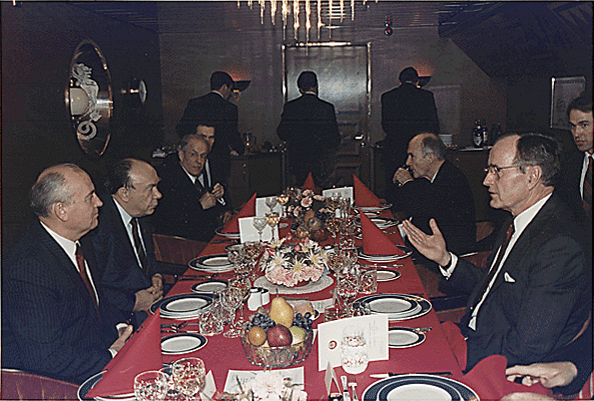Disarmament lessons from the Chemical Weapons Convention
By Mikhail Gorbachev, Rogelio Pfirter | June 16, 2009
 Former US President George H.W. Bush with former Soviet leader Mikhail Gorbachev. Credit: National Archives and Records Administration
Former US President George H.W. Bush with former Soviet leader Mikhail Gorbachev. Credit: National Archives and Records Administration
The recent joint declaration by U.S. President Barack Obama and Russian President Dmitry Medvedev to negotiate a new treaty reducing their countries’ nuclear stockpiles as a first step toward “a nuclear-weapon-free world” has spurred hopes for renewed progress in global disarmament after a decade of gridlock. An excellent example of how nations can work together effectively within a multilateral framework to eliminate weapons of mass destruction is the Chemical Weapons Convention (CWC).
The convention is unique in the sphere of disarmament and nonproliferation–an international treaty that abolishes an entire class of weapons of mass destruction under a stringent regime of inspections to verify compliance. Since its entry into force in April 1997, the convention has attracted 188 States Parties representing 98 percent of the world’s population and chemical industries, the fastest rate of accession for any arms control treaty in history.
In this time, 43 percent of the chemical weapons declared by seven “possessor” states have been verifiably destroyed, and three of these states have eliminated their stockpiles altogether. At the current pace, the global figure will more than double to at least 90 percent by 2012. In addition, all of the facilities that produced these deadly weapons have now been dismantled or converted to peaceful uses.
Parallel to these historic disarmament measures, a regime of industrial inspections has been established under the convention to ensure that new chemical weapons do not emerge and to prevent the illicit spread of toxic chemicals that could be used for weapons. The global chemical industry has been a valuable partner in these efforts by actively promoting adherence to the convention and helping to sustain the effectiveness of the industrial inspections, which have been conducted in more than 80 countries to date.
The convention’s implementing agency, the Organisation for the Prohibition of Chemical Weapons (OPCW), offers important additional benefits to member states. It has mobilized significant resources to build their capacities to protect against the possible use of chemical weapons and advanced the peaceful uses of chemistry for economic development by facilitating the exchange of scientific knowledge and expertise. These programs are based on an ethos of mutual support and have attracted increased interest as a means to reduce the risk of terrorists using chemical weapons.
The CWC has several distinctive virtues that in our view are directly relevant to the goal of eliminating both nuclear and biological weapons. The first is its comprehensive nature. Previous treaties on chemical weapons demonstrated that so long as they were allowed to exist, they would be used. The convention aims to remove this threat by obligating the destruction of all existing chemical weapons and banning the development and production of new ones. While this goal remains a work in progress, the possession and use of these weapons has been delegitimized by an overwhelming majority of countries.
Another virtue of the convention is its nondiscriminatory character. All member states share the same rights and obligations, and those with chemical weapons must declare and destroy them, without exception. As well, every member with a chemical industry covered by the convention must subject it to international inspection for nonproliferation purposes. A third virtue is that OPCW policy decisions are rendered by consensus, which requires competing interests to be reconciled to reach agreement on all policy issues. This process can be difficult and time-consuming, but over time it has returned great dividends in sustaining the trust and commitment of members.
These virtues have enabled rivals to find common ground for strengthening international peace and security. The United States and Russia, which held the vast bulk of chemical weapons at the end of the Cold War, led the way in concluding the multilateral negotiations on the convention and have shown impressive commitment to completing destruction of their entire stockpiles.
Significant challenges remain to the complete abolition of chemical weapons. Seven countries remain outside the convention, including several suspected of having active chemical weapons programs. The United States and Russia will both need to accelerate their efforts in order to meet the convention’s legally binding deadline of April 2012 for completing stockpile destruction. And advances in science and technology pose constant challenges to the effectiveness of the OPCW’s industrial inspections regime.
World leaders should not see the virtues of the CWC as a panacea for nuclear and biological weapons, which have different strategic and technical dimensions. But the convention has demonstrated that given the political will, eliminating weapons of mass destruction in an equitable and verifiable manner is feasible.
The United States and Soviet Union decisively put the abolition of nuclear weapons on the international agenda more than 20 years ago, which led to major nuclear force reductions in Europe and legitimized the international goal of eliminating nuclear weapons altogether. With review conferences scheduled for the Nuclear Non-Proliferation Treaty, the Biological Weapons Convention, and the CWC during the next three years, the international community should seize the moment and move decisively to rid the world of all weapons of mass destruction.
Together, we make the world safer.
The Bulletin elevates expert voices above the noise. But as an independent nonprofit organization, our operations depend on the support of readers like you. Help us continue to deliver quality journalism that holds leaders accountable. Your support of our work at any level is important. In return, we promise our coverage will be understandable, influential, vigilant, solution-oriented, and fair-minded. Together we can make a difference.
Topics: Biosecurity, Nuclear Weapons, Opinion















